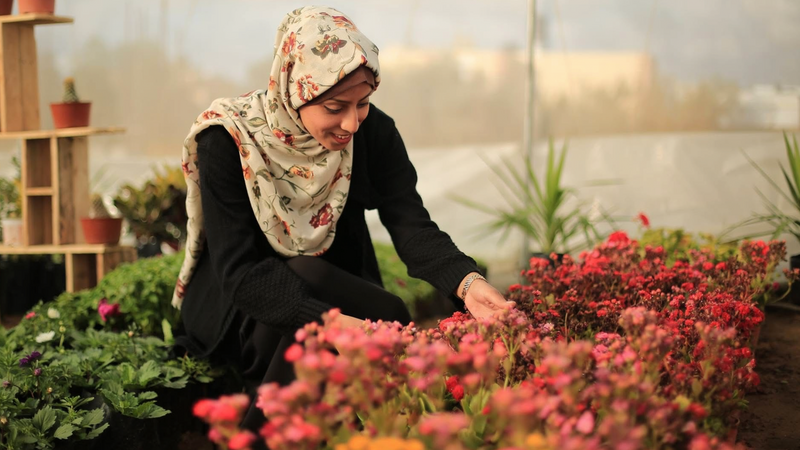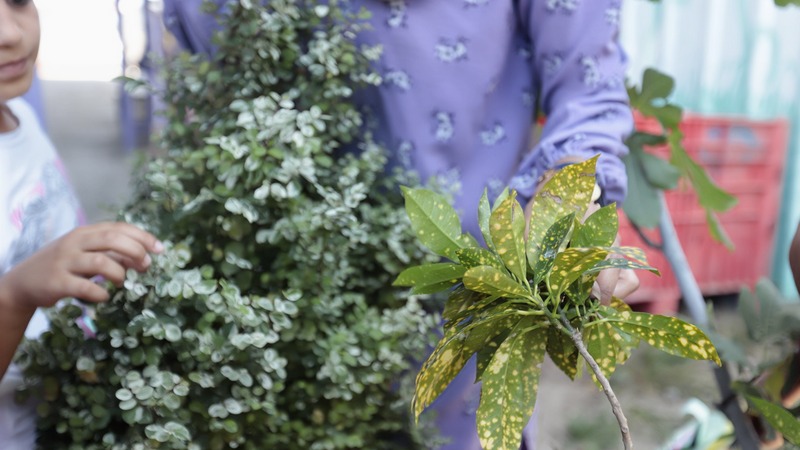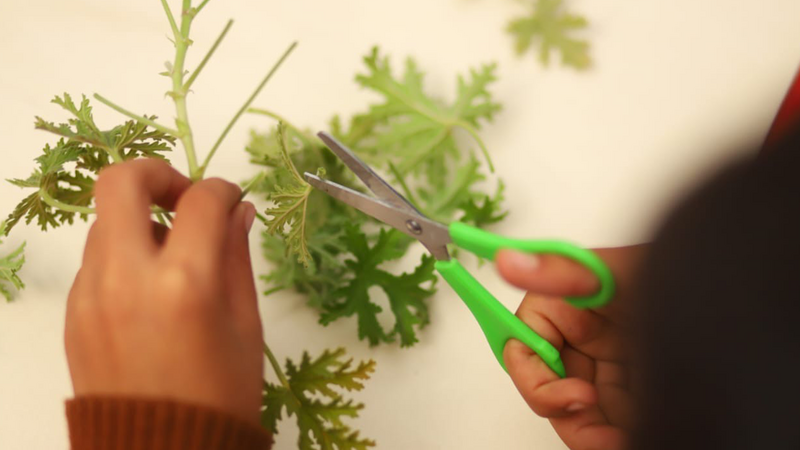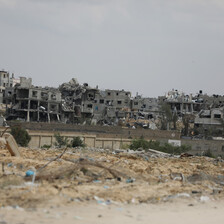The Electronic Intifada 29 April 2025

The author at a farm in the Khan Younis area before the current genocidal war.
Despite everything we have gone through in Gaza over the past year and half, the situation has not been as hellish as it has been in these last difficult days.
I’ve never had such terrifying daily experiences – warplanes shaking my home, shooting from low-flying aircraft that sounds like it will hit our roof, nonstop artillery fire from tanks – until now.
The Israeli army is encroaching on where I live in al-Fukhari, east of Khan Younis in southern Gaza, and its ground forces are present in the surrounding areas. The area has become extremely perilous due to the frequent explosions and random shelling.
I can’t believe this is happening in our once peaceful and bucolic agricultural area.
Al-Fukhari has been my home since 2002. My family ended up here two years after Israeli troops bulldozed my childhood home in a refugee camp west of the city of Khan Younis in the middle of the night during Eid al-Fitr in 2000.
Following the razing of our home in the camp, my family was displaced from one house to another for two consecutive years until we landed in al-Fukhari.
Al-Fukhari was in the early 2000s an undeveloped and agricultural area. UNRWA, the UN agency for Palestine refugees, built homes there to house displaced families like mine.
At the time, al-Fukhari lacked infrastructure and living there was not easy for us at first. We had to go to the city center to buy the things we needed and I was not used to village life. I was accustomed to life in the camp and deeply anxious about how I would ever get used to being in this area, so far from everything that I knew.
It was sparsely populated, with no more than 7,000 residents, but I soon got used to it and people readily welcomed us. “The area was empty, and you brought life into it,” a schoolmate once said to me.
Tranquility
Al-Fukhari was tranquil, unlike life in the overcrowded camp in Khan Younis.
I attended the middle school in the area. Many of the students belonged to farming families who owned land and we enjoyed the harvest seasons together.
I will never forget the green almond season, which occurs this time of year, a joy that we are currently being deprived of. Each student would fill her schoolbag with those green almonds, tender for only a few short weeks. I would return home with almonds for my delighted mother.
We had not previously owned farmland. Our new home in al-Fukhari had a small plot and we learned about growing food from our new friends and neighbors. I would ask my schoolmates about different types of tree seedlings, and they would give me some to plant in our tiny home garden.
We began to adapt to the environment and its agrarian lifestyle and I came to love it. When I went to school, I would see landowners and workers planting or harvesting the land. During the summer break from school, my siblings earned a few shekels per day for hours of work harvesting crops.
We got our vegetables and fruits directly from the land – both our plot of land and the land around us. Our friends who owned land in this area shared their produce with us: oranges, lemons and other fruits.
I became attached to al-Fukhari. I loved the pure air and the way it would become blanketed in green and flowers during spring. The agrarian lifestyle and sparsely populated area suited my quiet personality. I would spend time walking through the fields belonging to our neighborhoods and visit my schoolmates’ land to play and pick fruit to bring home to my mother.
But the occupation constantly casts a shadow over us.
When we still lived in the camp, we would see soldiers from a distance of only a few meters as they patrolled behind the iron fence of the settlement across from us.
My experiences in the camp in Khan Younis, where I lived for my first eight years, never left me. I’ve not forgotten the smell of tear gas the soldiers fired constantly; I spent my childhood smelling that awful gas.
I was exposed to it dozens of times. It burned and made my tears run down my face and caused me to lose my ability to see and breathe.
Even after the Israeli army dismantled the settlements and unilaterally withdrew from the Gaza Strip in 2005, I would imagine that smell and remind my mother of it, because it was part of that exhausting childhood.
Most of the people in al-Fukhari are simple farmers singularly focused on taking care of their land. But this did not spare them from Israel’s violence.
During the 2008 war, while we were living in al-Fukhari, a tank blocked the road and fired shells. We temporarily sought refuge with our relatives back in the camp in Khan Younis.
I lived through all the wars while I was in this area and was displaced during each because it is near the boundary with Israel and exposed to artillery shelling. But those terrifying episodes are nothing compared to this war, during which al-Fukhari was bulldozed and depopulated.

The author showing children how to care for plants.
Since the Israeli army began imposing the so-called Morag Corridor severing Khan Younis from Rafah in Gaza’s south earlier this month, we have barely slept due to the frequency and intensity of the detonation of buildings, land leveling, gunfire and indiscriminate shelling.
The Morag Corridor is named after a now evacuated and destroyed settlement in the area. Israel Katz, the Israeli defense minister, said that the “entire area” between the Philadelphi Corridor along Gaza’s border with Egypt and the Morag Corridor will be part of an “Israeli security zone.”
Since the beginning of the war, we have been hearing regrettable and frustrating statements from Benjamin Netanyahu, Israel’s prime minister, and his government ministers that increase the psychological pressure on us.
But they do not know how much we love this land and how much we value taking care of it.
When there was a ceasefire in January, everyone rushed to start their lives again, despite the destruction and the horrific killing. Our love for this beautiful land makes us like the phoenix that rises from the ashes.
What Israel calls the Morag Corridor is within walking distance of us and I had classmates who used to walk to school from there. It was an open, agricultural area and we enjoyed its natural beauty. But the Israeli army forced the residents of the area to flee and it is now demolishing homes and leveling land on a daily basis.
The destruction of the land that we depend on for our fruit and vegetables is part of Israel’s use of starvation as a weapon of war against Gaza’s people. The Israeli army prevents farmers from reaching their lands in al-Fukhari, and whenever I hear the sound of an explosion, I feel it in my heart. I imagine those beautiful areas and weep over their loss; we feel helpless in the face of this unjust machine.
Pure hell
Our friends from what is now the Morag area, who would harvest their vegetables and sell them to us in town, are now pushed off of the land that they tended with great care.
When we ask them about the status of their land, their eyes fill with tears and they grieve over its loss. Like a child, the owner of the land nurtures it throughout his life, inheriting it from his ancestors and protecting it as if it were a part of his soul. The tyrannical Israeli army forces the farmer to sacrifice his soul to save his life.
I am friends with Gaza’s Green Girls. As part of their bigger agricultural engineering project, the Green Girls established a small farm in the Khuzaa area east of Khan Younis just a few months before October 2023. The army completely destroyed the farm after all the young women’s hard work to build it.
The Green Girls also have a farm in my neighborhood in al-Fukhari and during the ceasefire that began in January, they were harvesting the crops and selling them in the market.
When the ceasefire collapsed and the army encroached on the area, the danger to the women increased. But they risked their lives to inspect the farm, tend to the crops, harvest them and sow new seeds. Since the Israeli army ordered people in al-Fukhari to evacuate earlier this month, the girls have been unable to reach their farm due to the continuous artillery shelling.
It’s pure hell that we’re living in. I have a constant headache and pain in my ears from the noise of tanks moving in the areas around us. I’m forced to hear the constant sound of homes being bombed, their owners’ lives and dreams being shattered. I’m forced to hear the gunfire from low-flying aircraft, terrified as I think about who those bullets are hitting.

From a lesson in caring for plants that the authot gave her students.
We used to eat from our land and never felt hungry. But that land which brought us sustenance is now destroyed and we’re experiencing famine – something I could never have imagined. I’m now eating one meal per day so that there’s more for my sick mother.
We hate starting our day by thinking about how we’re going to eat.
With Gaza under siege since 2007, we’ve gone with little before. But we’ve never gone without anything – no commercial goods, no aid, nothing.
I used to buy produce at the market from a vendor who grew food in the area and would sell from his cart a variety of rare fruits every season. I miss that vendor and I know that he lost his land too.
Our friends used to host us on their farms and we used to eat the fruit of those lands. We were never without lemons before the war. Now a kilo of lemons costs $30 – if we can find them – as the agricultural areas that saved the people from famine are stripped of any capacity to support life.
What we experienced in the war made us see the world’s inhumanity and how there is no international law that protects civilians, children, women and the elderly.
We are human beings like any other people in the world. We have dreams for the future and are ambitious and intelligent people who want to live in safety and security in our country.
Our past and future are tied to Gaza and we very much deserve life.
All images courtesy of the author.
Ruwaida Amer is a journalist in Gaza.





